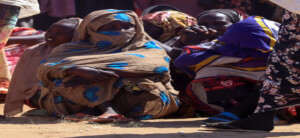Darfur farmers present report on herder attacks
According to a preliminary report by Darfuri farmers in South and North Darfur, at least 50 farmers were killed and injured by armed herders in November and December. North Darfuri students staged a protest in Khartoum against the continuing herders’ attacks.
The report said that 20 farmers were shot dead and more than 30 others sustained bullet wounds in attacks by militant herdsmen in the eastern parts of the Jebel Marra massive. About 7,000 acres planted with millet, sorghum, sesame, groundnuts, and various vegetables were damaged or destroyed.
 Farmers protest in El Fasher, capital of North Darfur, October 9, 2019 (Social media)
Farmers protest in El Fasher, capital of North Darfur, October 9, 2019 (Social media)
According to a preliminary report by Darfuri farmers in South and North Darfur, at least 50 farmers were killed and injured by armed herders in November and December. North Darfuri students staged a protest in Khartoum against the continuing herders’ attacks.
The report says that 20 farmers were shot dead and more than 30 others sustained bullet wounds in attacks by militant herdsmen in the eastern parts of the Jebel Marra massive. About 7,000 acres planted with millet, sorghum, sesame, groundnuts, and various vegetables were damaged or destroyed.
“In particular the areas of Umsiyala, Dali, Koto, Karfala, Um Laouta, Kadarik, and Tangara in Tawila and East Jebel Marra localities are prone to fierce herders attacks these days,” the report reads.
None of the perpetrators have been arrested. The farmers submitted several complaints to the authorities of South and North Darfur, but “no one paid any attention to our case”.
‘Freedom, peace, and justice’
Students from Tawila locality in North Darfur students organised a protest in front of the Ministry of Justice in Khartoum on Monday, against the killings, rapes, thefts, and the occupation of farmlands by militant herders in the locality.
They presented a memorandum to the Ministry, calling for the implementation of the slogans of the revolution, “Freedom, peace and justice”, and “Just retribution”. They urged the disarmament of the government militias and herders’ groups, and the strengthening of the police in the area.
Radio Dabanga’s editorial independence means that we can continue to provide factual updates about political developments to Sudanese and international actors, educate people about how to avoid outbreaks of infectious diseases, and provide a window to the world for those in all corners of Sudan. Support Radio Dabanga for as little as €2.50, the equivalent of a cup of coffee.












 and then
and then